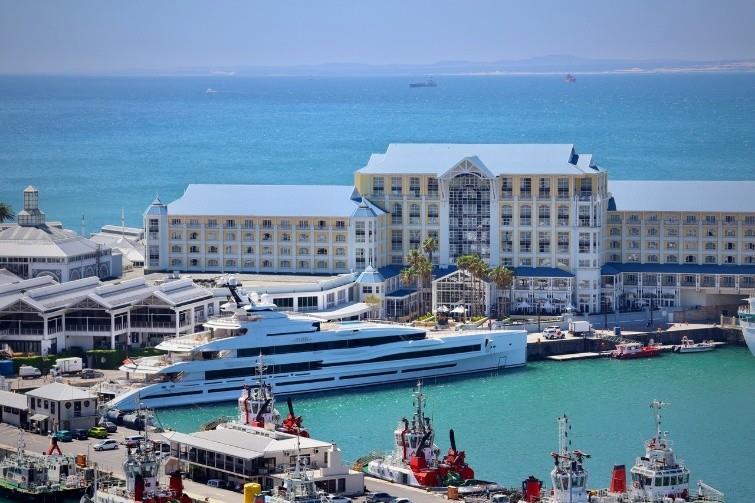
From crisis to catalyst: How global cruisers revived South Africa's Marine Economy
by African Boating Conference 12 Oct 2025 23:08 PDT

How global cruisers revived South Africa's Marine Economy © African Boating Conference
When Covid-19 brought the world to a halt in 2020, it also froze one of the most adventurous corners of international travel — ocean cruising. For decades, South Africa had quietly served as a vital stopover for yachts circumnavigating the globe, with ports like Richards Bay, Durban and Cape Town welcoming a small number of visiting vessels each season. That all changed overnight when borders closed, and global passage-making stopped.
But from crisis came opportunity. As dozens of yachts found themselves stranded across the Indian Ocean with no ports to enter, two members of the Ocean Cruising Club (OCC), John Franklin and Jenny Crickmore-Thompson stepped in. Working with South Africa's maritime authorities, they successfully lobbied to reopen the nation's ports for a limited six-week window — a lifeline for crews adrift and a spark that would reignite an entire sector.
During that brief period, 88 yachts arrived — at a time when most of the tourism economy lay in ruins. To justify the emergency opening, John Franklin compiled a detailed spreadsheet estimating the direct spend of each yacht on repairs, berthing, provisioning, and local services. The results were startling, especially to the Maritime authorities. Even amid lockdown, these visiting sailors injected millions of rand into coastal economies.
When the Department of Transport and maritime officials saw the figures, a temporary measure became permanent policy. A new marine notice required all incoming non-SOLAS small craft (i.e. private yachts) to register for authorisation to enter South African waters — and tasked John and Jenny with managing it. As the government could not contract individuals, OSASA (Ocean Sailing Association of South Africa), was founded. OSASA is a non-profit volunteer organisation dedicated to coordinating arrivals and supporting foreign cruisers.
Almost immediately, the effects were visible. Clubs and marinas began rehiring laid-off workers. Chandlers reopened. Mechanics, sailmakers, and divers found themselves back in demand. The revenue from these yachts flows directly into the refit yard's, service providers and of course most significantly into tourism.
A Rising Tide of Visitors
Since that turning point, the numbers tell a remarkable story of recovery and growth:
- 2020: 88 yachts (in just six weeks)
- 2021: 102 yachts — despite ongoing travel restrictions
- 2022: 164 yachts
- 2023: 217 yachts, including major rallies
- 2024: 252 yachts
- 2025 (forecast): Over 292 yachts expected
This steady rise — more than tripling arrivals in just five years — reflects not only global cruising routes shifting away from the Red Sea (due to piracy and geopolitical tension) but also South Africa's strengthening reputation as a welcoming and well-equipped haven.
Social media has played a crucial role. "Ninety-five percent of the yachts that round the Cape of Good Hope share glowing accounts," says Jenny. "They rave about the service, the friendliness, the value for money — and the adventure."
Indeed, with the South African rand trading around R23 to the pound, R17 to the US dollar and R20 to the euro, international sailors find local costs delightfully affordable. At the same time, South Africa offers world-class repair facilities, chandlery networks, and marine professionals — the first true service hub since leaving the Far East or Australasia.
Counting the Economic Impact
A 2020 analysis estimated that visiting yachts spend between R300,000 and R350,000 during a three-month stay. Adjusted for inflation and increasing vessel size, that figure now likely sits between R350,000 and R400,000 per yacht. over R86 million in direct local spending. John made the very important point, "The projected R86 million does not include expenditure arising from round-the-world races. These events pull in International supporting team crews for each boat for the duration of the stopover to manage their maintenance programmes prior to the Southern Ocean leg. This often includes hull repairs, new sails and rigging as well as replacement equipment and, of course, provisions."
These races have an enormous economic impact on local communities. It is critical for governments to understand this to fully comprehend the value of Marine Tourism to the economy.
On top of this crew changes, and visiting family or friends need to be factored in. Much of that money flows straight into yacht clubs, marinas, maintenance yards, service providers and of course Tourism— the very foundations of South Africa's coastal economy.
Anchoring for the Future
Yet while the benefits are clear, the infrastructure is lagging behind. Many marinas struggle with limited berthing, particularly during the busy October-to-December cruising season. Worse, the limited leasing structure on yacht clubs, in some cases on a month-by-month basis, has stifled long-term investment and facility upgrades.
If South Africa wants to build on this unexpected maritime success story, it must invest in its own blue tourism infrastructure — not only to accommodate growing demand, but to recognise the real value of these ocean-borne visitors.
What began as a six-week crisis response in 2020 has evolved into a sustained and growing economic engine.
With better facilities, stable and long-term marina lease policies, and continued hospitality and tourism spend, South Africa could cement its place as the premier gateway for global cruising between the Indian and Atlantic Oceans.
Industry leaders and innovators are invited to hear how South Africa is positioning itself as a significant global boating hub and to explore the new opportunities emerging across the continent at the African Boating Conference, taking place 21-22 October in Cape Town.
www.africanboatingconference.com